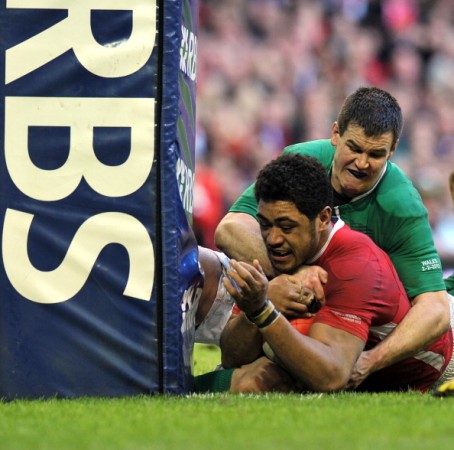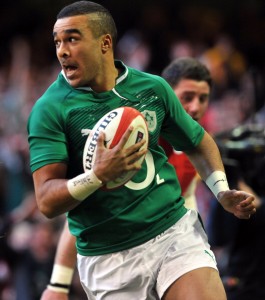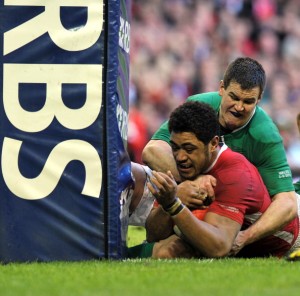
Man on the run: Brian O'Driscoll was as influential as ever despite being stripped of the Ireland captaincy
By Claire Glancy
BOD’S HANDS… Zebo’s feet… First half demolition… Second half defensive scrambling…
It’s hard to know where to start with the latest Celtic clash in Cardiff because, as the late Belfast comedian Frank Carson would have said, “It’s a cracker!”
It’s said every year: momentum is key. Get off to a good start and it sets the tone for your championship. Given recent performances by both nations no one really knew how this game would pan out. Did Ireland have momentum following their impressive victory over the Pumas or was that merely a fluke? As defending Champions would Wales relish the chance to start afresh and end their losing streak? Beware the wounded Dragon, especially in the RBS 6 Nations.
From an Irish perspective most of the focus in the build-up was on the captaincy. Why would Declan Kidney dare to take the reigns from Brian O’Driscoll, Ireland’s Grand Slam-winning skipper and arguably the greatest rugby player the country’s ever produced? It didn’t seem to make sense.
But having watched Ireland spring into action at the Millennium Stadium maybe Kidney has got it right. Is this the dawning of a new era for Irish rugby?
In the last few years Irish fans have looked on as Wales brought through exciting young players, not least Sam Warburton who became the youngest ever Rugby World Cup captain in 2011. Then it was England’s turn as Stuart Lancaster’s cull saw them bounce back from a disappointing World Cup to be runners-up in last year’s Six Nations.
Kidney has been criticised for his conservative selections and unwavering loyalty to some of the old guard but when injuries forced his hand in the autumn, new faces appeared on the team sheet and with them came a new captain.
Jamie Heaslip’s appointment may not have been dealt with in the same diplomatic manner Keith Wood described his handover to O’Driscoll, but as Ireland prepare for life after BOD perhaps it gives other players the chance to come out from the shadow of the so-called ‘golden generation’.
O’Driscoll proved on Saturday that he doesn’t need the captain’s armband to highlight his leadership. The man leads by example. He may have won the Man of the Match award, but what we’re starting to see in the Ireland team is a collection of leaders emerging.
At Friday’s captain’s run it was Johnny Sexton rather than Heaslip who commanded the squad’s attention as they took a look around the stadium. And why shouldn’t he? It was in this very ground that his half-time team talk inspired Leinster to snatch the Heineken Cup right out of Northampton’s lap.
On Saturday Chris Henry made his first Six Nations appearance after 50 minutes, but that didn’t stop him barking orders to the pack when the Welsh comeback was in full flow.
This new-found confidence has brought energy to Ireland. Yes, they let their lead slip in the second half but they’d forced Wales to change their game plan. For the first 45 minutes Ireland dominated almost every aspect of play. By winning the contact at the breakdown, dominating the set-piece, standing deeper and spreading the ball wider, they were able to get outside the Welsh blitz defence.
An initial look at stats suggests there is no way Ireland should have won that game: 37% possession, 35% territory, 13 penalties conceded to Wales’ eight. But the big difference comes in defence. Ireland made 176 tackles to Wales 101. Sean O’Brien’s 23 tackles were more than Sam Warburton and Toby Falateu managed together.
The fact that Ireland let Wales back into the game shows there is plenty to work on ahead of the England clash but what they proved on Saturday is that the performance against the Pumas wasn’t a one-off. Changes are afoot in Irish rugby in terms of captaincy, players and style – and with that hopefully results. He who dares….
Follow Claire Glancy on Twitter @claireglancy








